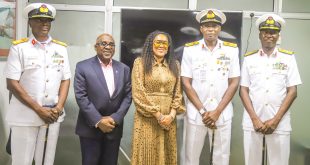Related Articles
The Minister of State for Transportation, Senator Gbemisola Saraki, says the Federal Government is unbundling and commercialising the Nigerian Railway Corporation to optimise its operations and advance private sector participation.
Saraki spoke at the Nigeria International Partnership Forum in Paris on the development of the transport sector.
She said the unbundling would drive competition in the industry, enhance service delivery for customers and improve infrastructure and other asset maintenance.
She told potential foreign investors at the event to explore investment in the sector, adding that the unbundling would reposition the corporation for effective management and efficient service delivery.
The Minister said the NRC would be unbundled into four subsidiaries, namely: Regulatory, Infrastructure (network creation, upgrade and maintenance), Operations and Services (the rolling stock operations, rolling stock creation and procurement and rolling stock maintenance).
Saraki said: “There have been renewed commitments to railway transport as a key component for socio-economic transformation.
“Of note is the 25-year strategic plan targeted at the rehabilitation of all the existing narrow gauge rail lines, construction of new standard gauge lines and connection to all sea ports.
“There are also connections to state capitals, mining and agricultural clusters and technological hubs by rail, as well as their operation and maintenance in the country.
“This has led to some success stories such as the commissioning of the Abuja-Kaduna, Warri–Itakpe and the Lagos-Ibadan rail lines, as well as the wagon assembly plant in Ogun State.”
According to Saraki, these are now all operational for both commercial and passenger activities.
Saraki said Nigeria’s rail projects have the capacity to generate sustained freight growth of a 7.9 per cent from 2021 to 2025.
On the maritime sector potential, the minister said Nigeria had the second longest length of waterways in Africa, covering about 853km.
She said the country was also endowed with extensive coastline – 10,000km of inland waterways and an exclusive economic zone of 200 nautical miles as well as additional 150 nautical miles of continental shelf in the process.
She said: “We are a dominant player in the West and Central African sub-region and the Gulf of Guinea (GoG), controlling over 70 per cent of shipping traffic in the sub-region.
“As a maritime nation, Nigeria plays important roles through its relevant agencies to check the menace of maritime insecurity and other safety challenges in the Nigerian maritime domain and in the GoG region.”
The Minister said that with the implementation of right policies and deployment of modern equipment as well as collaboration with other maritime security agencies, the country had significantly curbed piracy and sea robbery in the region.
Saraki said: “The International Maritime Bureau has severally commended this initiative and, in one of its reports, it noted that the number of kidnappings and robberies in the Gulf of Guinea in the second quarter of 2021 is the lowest since 2019.
“While 33 incidents of piracy were reported in the last quarter of 2020, six cases were reported in the second quarter of 2021.”
Saraki estimated the nation’s federal road network to be 35,000km, representing about 17 per cent of the national road network of 200,000km.
She said investors should take advantage of the Executive Order 7, which seeks to mobilise private investment into the development of key roads and bridges.
The Minister said that activities had returned to the air transport sub-sector after the COVID-19 global disaster, with restoration of bilateral air agreements and springing of more domestic airlines with newer and modern aircraft in their fleets.
Saraki said that investors should key into the plan to establish Nigeria’s national carrier through a public/private partnership being vigorously pursued.
She also informed the gathering of a plan to concession the four major international airports in Nigeria: Muritala Mohammed in Lagos, Nnamdi Azikwe in Abuja, Mallam Aminu Kano in Kano, and Port Harcourt in Port Harcourt.
Saraki said investments and partnerships in the country would require prospective partners to show mutual respect and desire for justice and equity.
The Minister of Niger Delta Affairs, Senator Godswill Akpabio, said at the event that the Niger Delta region, which he supervised, was open for investment.
Akpabio said that the nine states that made up the region were safe and had enormous potential for investment in oil and gas, real estate, palm oil, infrastructure and agriculture generally.
 DailyrecordNg …Nigeria's hottest news blog
DailyrecordNg …Nigeria's hottest news blog









